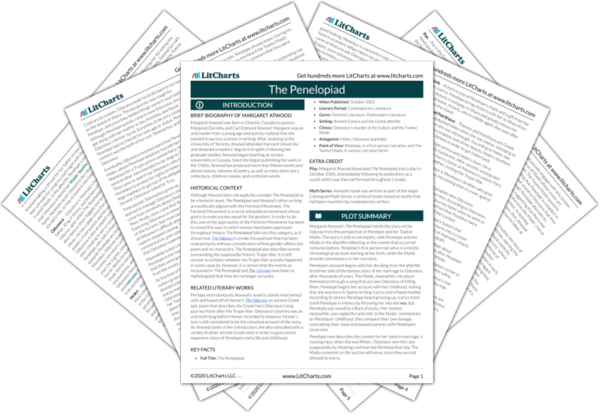Summary
Analysis
This chapter returns to Penelope’s first-person narrative as she describes her feelings after the Suitors and the Maids were murdered. Penelope had pretended not to believe that it was Odysseus who had killed the Suitors, continuing to pretend that she had not recognized him. She worried about how she would seem to Odysseus now that she was so much older.
Although Penelope professes to be upset at the Maids’ deaths, her actions suggest she is disturbingly unfazed. Instead, she mostly worries about whether Odysseus will find her sexually desirable. This casts doubt on the genuineness of the distress that Penelope says she feels.
Themes
When she left the women’s hall and went to the main one where Odysseus and Telemachus were sitting, she did not greet Odysseus right away—and Telemachus criticized Penelope for not welcoming him. Although Penelope loves Telemachus, she wished then for a second Trojan War to send Telemachus away to so he wouldn’t be there to boss her around. Penelope continued to act coldly towards Odysseus, thinking that her skepticism toward him would make him believe that she had been faithful all those years, and had not just welcomed any strange man into her home.
Penelope does act coldly towards Odysseus when she greets him, so she may hold him accountable for his murders after all. Penelope’s wish for a second Trojan War to get Telemachus out of her hair, meanwhile, is peculiar, since Penelope claims to have missed Odysseus desperately during his absence. It seems that Penelope may have enjoyed her independence more than she let the reader know—or else she just prefers her husband that much more to her son.
Themes
Penelope told Odysseus that he couldn’t be her husband, since he, unbathed, looked so unlike the clean, well-dressed man she knew. When Odysseus returned clean, Penelope then ordered Eurycleia to move the bed in Odysseus’s room, the one with the bedpost still in the ground. Odysseus, thinking it had been cut, became furious, and then Penelope pretended like this convinced her of his true identity.
Penelope’s desire and need to trick Odysseus and make him believe that she is only just discovering his identity is peculiar, and shows how much their relationship lacks trust and mutual respect. Penelope’s secrecy has also led to terrible consequences, notably the murder of the Maids.
Themes
Penelope and Odysseus then climbed into their marriage bed, which had gone unused for so long. Before they had sex, Penelope commented on how much older they now were. Afterward, Odysseus told Penelope stories of his travels that feature monsters and goddess, recounting all the lies and stories he told in order to deceive his way out of bad situations. Penelope then told Odysseus about the Suitors and her fake weaving project. Odysseus told Penelope how much he missed her, and Penelope said the same, asserting that she had always been faithful. Penelope says that they both were “shameless liars.”
Again, it seems strange that Penelope contentedly goes to bed with Odysseus after his decades long absence, his rumored affairs, and his murder of twelve of her friends and confidantes. Along with Penelope’s admission that she is a “shameless liar” right after her insistence that she has always been faithful, this suggests the rumors about Penelope’s infidelity and scapegoating of the Maids may be at least partly true.
Themes
Get the entire The Penelopiad LitChart as a printable PDF.

Soon after Odysseus returned home, he left again to attempt to purify himself after the Suitors’ murders and pacify Poseidon, and thereby satisfy a prophecy he heard while traveling. Penelope calls it “a likely story.”
Penelope’s labeling of Odysseus’s second departure as a “likely story” is clearly sarcastic, since it seems pretty clear that both Penelope and Odysseus know he is lying.
Themes












